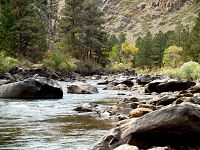Water Resources in a Changing Climate
19 Jan 2016
News Source: EOS
CZO community members were chosen as keynote speakers at Colorado State University's Hydrology Days 2015.
An article entitled "Water Resources in a Changing Climate" was published in EOS on January 13, 2015. Authors Adam N. Wlostowski, Erika May Smull, and Jonathan Quebbeman describe Colorado State University’s annual Hydrology Days that was held March 23-25, 2015 in Fort Collins, Colorado. This event gathers a multidisciplinary group of researchers, engineers, and government officials to identify problems and share solutions related to hydrology in a changing climate. The 2015 keynote speakers included members of the CZO community; Amilcare Porporato (Duke University,Calhoun CZO), Scott Tyler (University of Nevada at Reno, Southern Sierra CZO Collaborator), and Gordon Grant (U.S. Forest Service, CZO Steering Committee). Authors Adam Wlostowski and Erika Smull are currently students at CU-Boulder with Dr. Michael Gooseff, associated with the Boulder Creek CZO.
Water Resources in a Changing Climate
January 13, 2015
A look at the interconnected nature of hydrologic, ecologic, and socioeconomic systems shows that they are all vulnerable to anticipated changes in Earth’s climate. To anticipate how and when natural systems—water resources in particular—will respond to future climate scenarios, scientists need a robust understanding of two-way interactions between the land surface and the atmosphere on a large scale and between ecosystems and resource availability on a small scale. Models of these natural systems can inform management and regulatory tactics that optimize trade-offs between ecosystem resilience and human economic activity.
Modeling and managing hydrologic systems invoke one common theme: water’s essential nature for life and productivity. To predict and manage the fate of water resources on this planet, we need collaboration between researchers, engineers, and governments. Although seemingly disparate in methodology, modeling and managing hydrologic systems invoke one common theme: water’s essential nature for life and productivity.
Read the full article here.
Wlostowski, A. N., E. M. Smull, and J. Quebbeman (2016), Water resources in a changing climate, Eos, 97,doi:10.1029/2016EO043385. Published on 13 January 2016.
News Source:
READ MORE from EOS >>
News Category:
PEOPLE
Explore Further



